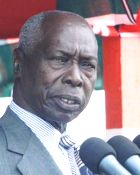Kenya urges dialogue to save Sudan peace deal
October 17, 2007 (NAIROBI) — Kenyan special envoy to Sudan on Wednesday pleaded with the country’s government and ex-southern rebels to start dialogue aimed at ending a crisis that threatens the landmark peace agreement.
 Kenyan former president Daniel Arap Moi made the appeal days after the Sudan People’s Liberation Movement (SPLM) withdrew from the government of national unity, accusing the National Congress Party (NCP) of balking in implementating the accord.
Kenyan former president Daniel Arap Moi made the appeal days after the Sudan People’s Liberation Movement (SPLM) withdrew from the government of national unity, accusing the National Congress Party (NCP) of balking in implementating the accord.
“All parties are encouraged to exercise restraint, respect past commitment [to the agreement], and adopt the route to dialogue,” Moi said in a statement.
“It is my genuine concern that failure to address the present crisis may lead to undesirable consequences in that country, which will threaten peace and stability in the region and disrupt normal life,” said the ex-president.
Moi, who launched the Sudan peace talks in 1994, called on the feuding sides “to embrace dialogue and reconciliation” that would lead to “an amicable solution … in the interest of the people and nation of Sudan.
“This is to remove all forms of suspicion that the spirit of equal partnership between the parties in the implementation of the Sudan Comprehensive Peace Agreement [CPA] is not being honored,” said Moi, who was appointed in July to monitor its impementation.
The SPLM recalled its ministers from the cabinet Thursday over what it called Khartoum’s failure to implement the 2005 peace deal that ended 21 years of fighting. At least 1.5 million people were killed and 4 million displaced.
On Tuesday, Sudanese President Omar Al Bashir reshuffled his cabinet in a bid to ease tensions that have alarmed foreign nations already grappling with a separate conflict in the country’s western region of Darfur.
Key in the reshuffle is the replacement of foreign minister, currently held by Lam Akol, who is considered close to Bashir’s NCP, and giving the post to Deng Alor.
But the SPLM has hinted rejoining the government if Bashir meets its demands, notably getting Khartoum’s troops out of the southern territory and resolving the status of disputed oil district of Abiye in central Sudan.
In September, the south Sudan government urged Moi to salvage the accord from unraveling, warning that the deal was being threatened by hard-liners in NCP.
The peace deal also calls for 50-50 sharing of oil revenue, and grants the south the right to vote in a 2011 referendum as to whether it would secede or reunite with Khartoum.
(AFP)
